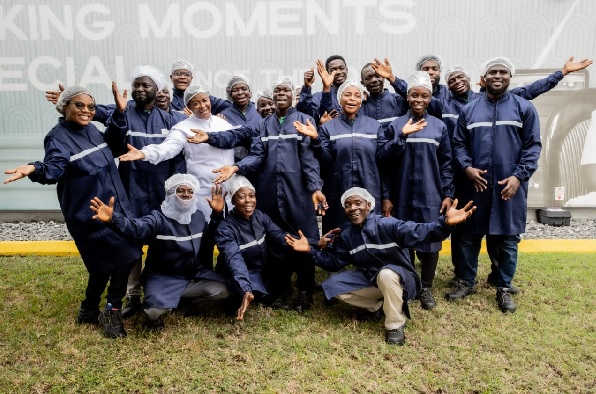Nestlé Ghana Ltd. organized an insightful factory tour for selected cocoa farmers on Wednesday, September 17, offering them a first-hand look at the various stages involved in processing their farm produce.
By 8:00 a.m. last Wednesday, the farmers, mainly from the Ashanti Region, arrived at the Tema Factory for what was their first-ever experience of its kind, aimed at providing them with an unforgettable and educational visit.
The tour was led by Abigail Eyram Ametepe, Production Supervisor for Beverages, who guided the farmers through different production lines, including the can manufacturing department, evaporated milk plant, beverages plant, cereals plant, and milk plant.
Before the tour began, Cecelia Annang, Manufacturing Excellence Officer, delivered a presentation introducing the farmers to the Tema Factory’s leadership team and providing an overview of its operations and product range, both for local consumption and export.
The visit concluded with a photography session and a delicious meal served to the farmers as a gesture of appreciation.
Creating shared value
Corporate Communications and Public Affairs Manager at Nestlé Ghana, Mrs Deborah Kwablah revealed that the company hosted 15 lead cocoa farmers from the Ashanti Region at its Tema factory for the first time to offer them a first-hand look at how their cocoa is transformed into products like Milo.
She emphasized that the initiative, part of Nestlé’s “Creating Shared Value” strategy, aims to strengthen relationships with farmers by showing them the impact of their work and encouraging them to adopt improved agronomic practices to boost yield and income.
"So there's shared value in what we do and that's why we call this creating shared value. So we create value for the farmer by training them and helping them to do the right agronomic practices so that they can get more from the land and then we can get more cocoa as we need," she said.
She said beyond supporting farmers on the field, Nestlé has invested in cocoa-growing communities by building and rehabilitating schools, drilling boreholes, and providing sanitation facilities.
She mentioned that earlier this year alone, the company commissioned 15 boreholes and five schools, with more projects underway.
Mrs Kwablah stressed that this support is not just corporate social responsibility but part of Nestlé’s core business strategy—creating value for farmers, Nestlé, and its shareholders alike.
"In some of these cocoa growing communities we have built schools from scratch, we have also rehabilitated schools that are not in the condition that we want a school to be. We've provided for them water and then in some areas we even provide toilet facilities," she said.
She added that due to the success of the visit, the company is considering making the factory tour an annual event for cocoa farmers.
Appreciation
Some of the farmers expressed their gratitude to the leadership of Nestlé Ghana for the experience, vowing to work even harder to improve their yields.
“I have been a cocoa farmer for 25 years, but I’ve never had an opportunity like this,” said 50-year-old Anthony Owusu. “I’m so excited to finally see how the production process works. I always knew our cocoa was used to make Milo and other products, but I didn’t know where or how it was done. Today, I’ve seen it with my own eyes. When I return home, I’ll share this great experience with my family and the entire Adansi Fumso Ketewa community.”
Kwaku Karikari, aged 52, shared a similar sentiment: “I started cocoa farming 30 years ago, and I’ve been drinking Milo for many years—but I never knew where or how it was made, despite being a cocoa farmer. Today, I’ve seen the connection between my work and the final product. This motivates me to work even harder and expand my production when I return to the Ashanti Region.”
“My name is Adwoa Kobi from Adansi Fumso Ketewa, and I’m 44 years old. I’ve been a farmer for many years, but I became a cocoa merchant three years ago. We work so hard, yet we often have no idea how our cocoa is processed into products like Milo. Being here at the Nestlé factory today is a dream come true. I now understand the immense value in cocoa farming, and when I return to my village, I’ll encourage others, especially the youth to venture into it.”
Grace Lartey, 45, added: “I took over the farm from my parents 20 years ago. Touring the Nestlé factory today has been very encouraging. I now see that cocoa farming offers many benefits not just for farmers, but for the entire country. I’m more determined than ever to continue working hard.”

